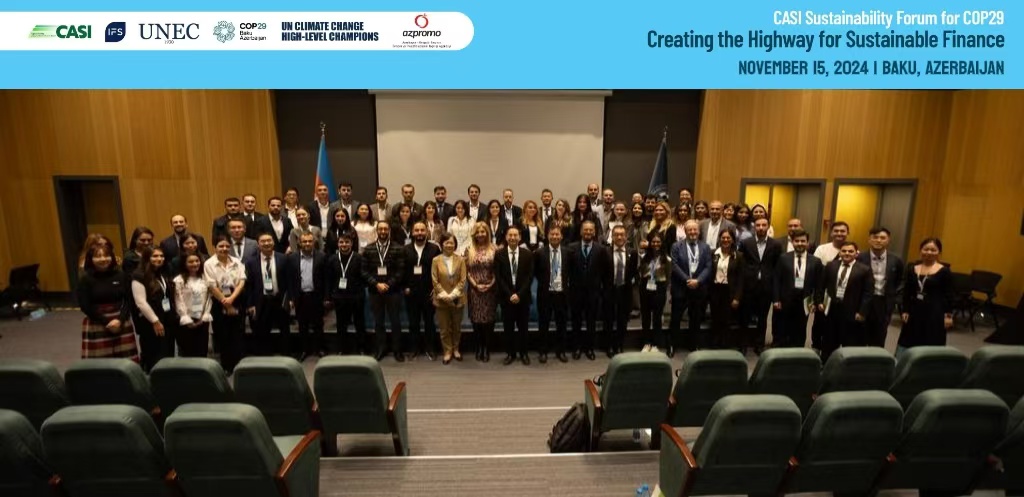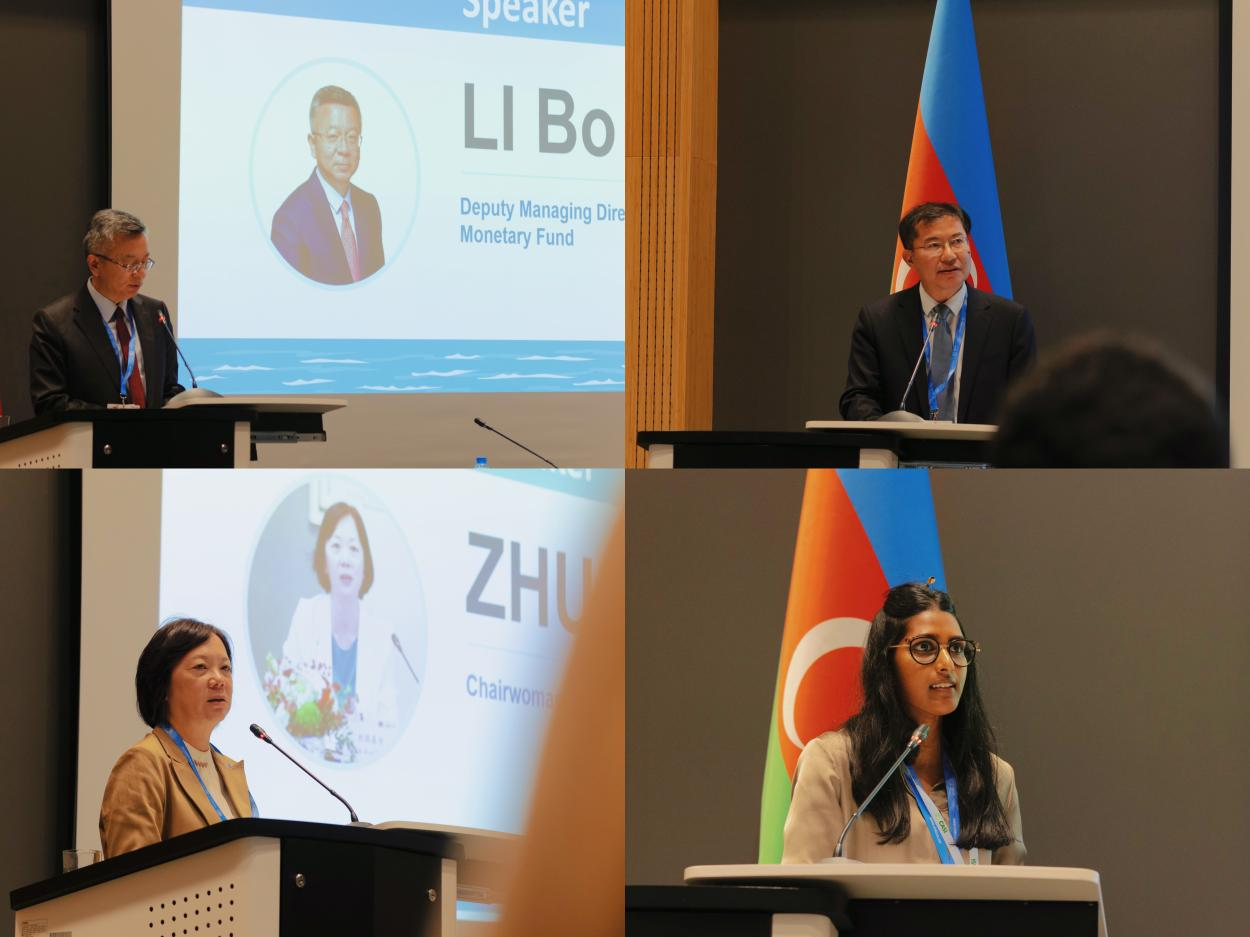CASI Sustainability Forum Held for COP29 in Azerbaijan
Baku, Azerbaijan – November 15, 2024 – The Capacity-building Alliance of Sustainable Investment (CASI), co-hosted with the Institute of Finance and Sustainability (IFS) and the Azerbaijan State University of Economics (UNEC), successfully concluded CASI Sustainability Forum for COP29. The event, supported by the Azerbaijan COP29 Presidency, the COP29 High-level Champion for Climate Action, and the Export and Investment Promotion Agency of the Republic of Azerbaijan (AZPROMO), drew over 150 participants from over 20 jurisdictions, including Azerbaijan, Kazakhstan, Tajikistan, Pakistan, India, Bangladesh, and Turkey, as well as experts from China, the EU, the UK, South Africa and Brazil.
The event served as a crucial platform for enhancing green finance knowledge among policymakers, regulators, and financial institutions across the ecosystem of sustainable finance in Central and West Asia. As Azerbaijan is hosting COP29, the event highlighted the nation's commitment to advancing sustainable finance mechanisms for developing countries.
The forum commenced with opening remarks from Dr. Ma Jun, Chairman of CASI and President of IFS. He said “Green finance presents a great opportunity for many Central and Western Asian economies, which have historically been dependent on oil and gas exports, to speed up their economic diversification and transition towards a low carbon economy. The global efforts to enhance interoperability of taxonomies and disclosure requirements will help reduce transaction costs and drive greater green capital flows, while capacity building is the most cost-effective public good in developing the sustainable finance eco-system in the Global South. CASI, as the key initiative in implementing the G20 TAAP, is on track to training 100,000 green finance professionals by 2030.”

In his welcome remarks, Dr. Huseyn Hasanov, Vice Rector of UNEC, emphasized, "With Azerbaijan currently hosting COP29, there has been a notable increase in sustainability awareness within the country. Sustainability is one of the values and direction of UNEC.”
Mr. Erik Solheim, former Executive Director of UNEP, highlighted the importance of finance in sustainability. He said “Addressing financing challenges, especially for adaptation, requires supportive policies and international aid. Effective legal frameworks can boost investment, and more initiatives are now emerging from the Global South.”
Mr. Shahin Mahmudzade, Executive Director of the Central Bank of Azerbaijan, emphasized the need for cross-sector collaboration to tackle climate change. The bank has launched a sustainable finance roadmap in 2023 and a sustainable finance taxonomy during COP29, aiming to guide the market towards a green economy. Upcoming guidelines include green loan principles and bank stress testing. By 2030, Azerbaijan aims to raise 2 billion AZN in sustainable investment.

Panel discussions centered on topics including Policy Framework for Sustainable Finance, Sustainability Disclosure, Financing for Low-GHG Transition, Carbon Pricing and Carbon Trading, as well as Roles of G20, International Organizations and Sovereign Wealth Funds.
A highlight of the forum was the launch of CASI Academy, an innovative e-learning platform featuring 18 comprehensive modules on sustainable finance. These modules, developed by industry experts, cover crucial areas including taxonomy, disclosure, financial products, climate risk assessment, and transition finance. The course materials are designed to be relevant and applicable to the needs of emerging markets and developing economies.
Dr. Bo Li, International Monetary Fund Deputy Managing Director, noted that climate change is a priority for the IMF because its mandate is to help member countries achieve macroeconomic and financial stability, economic growth, and employment. Climate change presents a risk to economic and financial stability while climate action creates opportunities for green growth and green jobs. He underscored the importance of limiting global warming to 1.5°C. Dr. Li present three key steps the world should immediately take to help mitigate the worst impacts of the climate crisis. First, all countries must urgently adopt more ambitious targets to cut greenhouse gas emissions. Second, the world needs a dramatic increase in climate finance, particularly from the private sector. Third, green technological innovation and diffusion must accelerate. Finally, Dr. Li highlighted the Climate Action Support Initiative's vital role in building capacity for sustainable finance.

In his closing remarks, Dr. Ma Jun summarized the event by emphasizing several key messages: countries with significant oil reserves should allocate more capital to invest in renewable energy; the common ground taxonomy can serves as a powerful tool to facilitate cross border green investments; efforts are need to reduce the cost of implementing disclosure requirements; subsidies and grant schemes for green finance have been effective in crowding in private green investment; sustainability-linked products are useful in driving energy transition; the clarification of Article 6.4 paves the way for an integrated global VCM, which will help fundraising for climate actions in emerging markets. He announced that CASI would host Sustainability Forums in South Africa and Malaysia in the first half of next year.
For media enquiry about CASI Academy and the forum outcomes, please contact:
Ms Jessica Tsang, Communications Lead, Capacity Building Alliance of Sustainable Investment (CASI)
Email: jessica.tsang@sprinkles.org.hk
Tel: +852 96630780
About The Capacity-building Alliance of Sustainable Investment (CASI):
The Capacity-building Alliance for Sustainable Investment (CASI) is an international cooperation platform aiming to deliver higher-quality and higher-impact sustainable finance capacity building services for developing countries, via developing a “global aggregator and distributor of sustainable finance knowledge”. Since its official launch in December 2023, CASI has over 60 member institutions including financial companies, associations, NGOs, service start-ups and higher education institutions, covering Southeast Asia, Latin America, Africa, the Middle East and other emerging markets.
For more information about our members and CASI, please visit our website: www.casi.net .
About The Institute of Finance and Sustainability (IFS):
The Institute of Finance and Sustainability (IFS) is a non-profit research institution specialized in the issues of ESG investment, natural capital, green technology innovation, and the low-carbon transition. Its mission is to advance green finance and sustainable development in China and beyond, through high-quality research on green finance policies, markets and products. It aims to become a globally recognized think tank and make substantial contribution to international efforts to conserve nature and combat climate change.
About the Azerbaijan State University of Economics (UNEC):
Established in 1930, the Azerbaijan State University of Economics (UNEC) is a leading center for economic education in the region. UNEC offers diverse bachelor's, master’s, and doctoral programs in Azerbaijani, English, Russian, and Turkish, focusing on student-centered learning. With 14 faculties, 17 departments, and 738 distinguished faculty members, UNEC prepares students for impactful global careers.
For more information, please visit the university website: https://unec.edu.az/en/
CASI Academy:https://academy.casi.net/login


